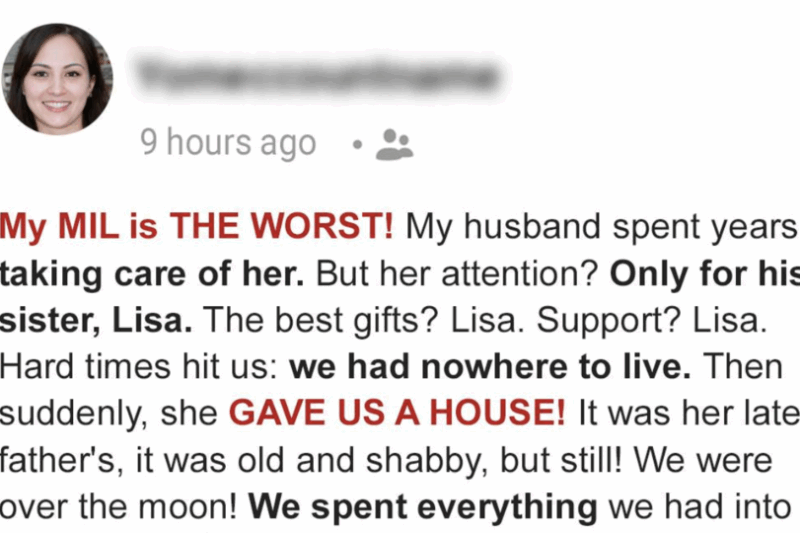When my mother-in-law, Fariha, retired, I imagined she’d step in to lend a hand with our three young children. Instead, she furrowed her brow and declared, “I’m not here to be your unpaid nanny. I’ve raised my son. Now it’s my time to rest.” Her words cut deep.
I confided in my husband, Muneer.
To my astonishment, he backed me without hesitation, proposing we ease up on catering to his mother’s demands. “She wants her freedom? Let’s give it to her,” he said. That moment sparked a gradual but undeniable shift in our family dynamic.
To grasp how we arrived here, you need to understand Fariha’s role in our lives. After losing her husband, she lived alone, with Muneer as her only child. She mastered the art of playing the martyr—always highlighting her sacrifices for Muneer, lamenting how rarely we visited, and claiming she was perpetually overlooked.
Meanwhile, our household was a whirlwind. With three kids under six, my unpredictable nursing shifts, and Muneer juggling his home-based IT repair business, we were stretched thin. When Fariha retired, I saw a chance for mutual support. She had time; we had chaos.
But that hope was short-lived.
“I’m ready to explore—maybe Turkey, perhaps Malaysia. After 40 years of work, I’ve earned the right to focus on myself,” she said, sipping tea in our living room while our toddler twins wailed nearby.
I wasn’t asking her to parent them. I only hoped for occasional help—a quick school pickup, an hour of relief.
Still, I masked my disappointment. “Of course, Aunty. You deserve your time.”
But that night, Muneer sensed my frustration. “Maybe it’s time we stop letting her guilt us into everything simply because she’s vocal about her struggles,” he said quietly.
His words surprised me.
For years, we’d bent to her will. We hosted Eid at our house because she “couldn’t bear solitude.” We lent her money when her pension lagged, fixed her car, set up her apps, and tiptoed around her moods. We weren’t ungrateful—her hardships were real. But the emotional weight was heavy.
That night, we chose to pull back. No more unsolicited offers. We’d only act when she asked.
Weeks passed. Fariha didn’t reach out. No calls, no visits.
Then she turned to Facebook.
Her posts were bold: selfies from a Penang beach resort, captioned “Finally living for myself” and “Done being taken for granted.” She shared cryptic quotes like, “Those who demand too much from others are bound to be let down.”
Fine. Enjoy your life.
But then she crossed a line.
On a post of our toddler’s artwork, she commented: “Sweet that some see parenting as a team effort. I managed it solo.”
I deleted it. I stayed silent. But I was furious.
It wasn’t her refusal to babysit that hurt. It was her implication that my need for support was a flaw.
Muneer saw it and shrugged. “Let her vent her drama online. We’re done engaging.”
So we stopped.
We ceased inviting her to every event. No more weekly check-ins. No more dropping everything for her “urgent” Wi-Fi crises.
The quiet got her attention.
Two months later, she called. “You’ve stopped visiting me.”
Muneer was direct. “We thought you were busy living your dream life.”
A long silence followed. “I didn’t think you’d cut me out,” she murmured.
He didn’t argue. “You wanted rest. We’re honoring that.”
For a time, we settled into a distant routine.
But life has a way of looping back.
In March, Fariha’s landlord sold her rental property. The new owner planned renovations and a rent hike she couldn’t afford. She had two months to relocate.
Suddenly, her calls became frequent.
“Beta, can you help me find a new place?”
“The listings are too expensive.”
“I’m not ready for a retirement home.”
We assisted with her search, but we didn’t offer more.
We didn’t say, “Move in with us.”
Then the hints began.
“Your guest room’s free, isn’t it?”
“Your house is so spacious…”
Finally, she asked outright: “Can I stay with you? Just until I sort things out.”
Muneer didn’t refuse, but he didn’t agree. “We’ll discuss it and let you know,” he said.
After hanging up, he turned to me. “I want to support her, but not if she’s going to act like she runs the place. We need clear rules.”
So we drafted terms.
If she stayed, she’d pitch in with chores, respect our kids’ schedules, avoid snide remarks about our parenting, and not invite unannounced guests.
No drama, period.
When we presented this, she bristled. “You’re treating me like a boarder!”
“No,” I said calmly. “We’re treating you like an adult in a busy home.”
She pouted but agreed.
The first weeks were tense. She stayed holed up in the guest room. But over time, things warmed.
She began helping with meals, fetching the kids when I was delayed.
One evening, I saw her reading to our son, her voice gentle, unaware I was watching.
The next day, she offered to take the twins to the park so I could rest after a night shift.
I wept quietly in the bathroom.
But then—plot twist.
A letter from our HOA arrived, citing complaints about “excessive child noise” and “guests overstaying” per neighborhood rules.
Guess who had a history of reporting neighbors at her old place?
Fariha.
Our HOA deemed guests staying over 30 days as “extended,” requiring prior approval. It was a minor issue—we filed the paperwork. But the irony stung.
Muneer chuckled. “Karma’s poetic. She used to wield rules like a sword. Now she’s tangled in them.”
We didn’t mention it to her, but she seemed to sense it. The next day, she sat me down.
“I’ve been hard to deal with,” she admitted softly. “I know I’ve acted like helping was beneath me. But honestly—I was scared.”
“Scared of what?” I asked.
“Scared of being pulled back in. Of being expected to mother everyone again. I didn’t know how to be in your lives without losing myself.”
I absorbed her words.
It wasn’t justification, but it was raw.
“We don’t need you to be the family matriarch,” I told her. “We just want you here. As you.”
That marked a shift.
Fariha opened up about her loneliness, how retirement made her feel unseen, how travel brought freedom but left her hollow.
We found a new flow. She taught our daughter to sew a button, watched our son build a Lego creation for her.
She even started cooking Sunday breakfast unprompted.
Then, one night, she offered to watch the kids so Muneer and I could have a date.
“I want you to have what I missed,” she said. “A partner. A moment to breathe.”
I hugged her, feeling like I was meeting her for the first time.
Weeks later, she found a cozy apartment nearby—close enough to walk. She moved out on her terms.
Now, she visits twice a week: once to babysit, once to simply be with us.
No guilt. No veiled barbs.
Just Fariha.
Here’s the takeaway:
Love shows up differently for everyone. Some say it through folded laundry, sliced fruit, or quiet presence after mistakes.
Sometimes, people need distance to see they want to embrace the chaos they once fled.
Fariha wasn’t the antagonist. She feared being consumed by others’ needs again. By setting firm boundaries and stepping back from her demands, we grew. So did she.
It’s okay to need support. It’s okay to set limits.
Above all, it’s okay to evolve—at any stage of life.
If you’ve navigated family boundaries or found redemption in unexpected moments, share this story. Let someone else feel understood.
❤️ Like if this resonated. Comment if you’ve faced a mother-in-law surprise of your own.




